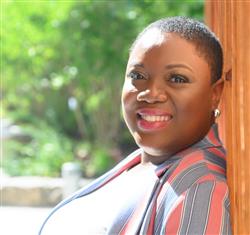From the Maternity Ward to the Classroom
August 24, 2020
Dr. Daihnia Dunkley, assistant professor of nursing, knew as a child she wanted to serve in the healthcare system. Her first dream was to become an OBGYN. But then, as the dynamic between mothers and daughters often expresses itself, Dr. Dunkley found herself profoundly influenced by her mother’s calling.
“As a little girl, I pictured myself as a doctor, but gained the inspiration for nursing from my late mother, who became an RN after spending many years as a school teacher.”
But mom, Ms. Joy Fullyer-Campbell, wanted her daughter to be certain nursing was the career she really wanted, so young Daihnia Dunkley enrolled in the Licensed Practical Nurses program at Nassau BOCES. It was there things crystalized for her.
“I loved the experience, specifically the connection that nurses have with patients. I was intrigued by the various career pathways and flexibility, so I switched my focus from medicine, and declared nursing as my major when I entered college.”
Dr. Dunkley earned a BS in Nursing at Hampton University, and in 2004 began a career in maternal-child healthcare. Four years later she was a Family Public Health Nurse/Nurse Home Visitor with the NYC Department of Health and Mental Hygiene Nurse-Family Partnership, and then moved on to New York Methodist Hospital. It was there she became an administrator, managing a 49-bed mother-child unit.
Leadership was now defining Dr. Dunkley’s career, as Nurse Manager of Women and Children’s Services at St. John’s Episcopal Hospital; Assistant Director of Nursing OBS/GYN Services at Harlem Hospital Center; Patient Care Director at New York Presbyterian/The Allen Hospital; and most recently Director of Nursing (Women and Children’s Services), SUNY Downstate Medical Center/University Hospital of Brooklyn.
But through these experiences, something was gnawing at Dr. Dunkley. She identified disparities within the healthcare system, and their impact on practitioners and patients, especially those of color. As she transitioned from bedside nursing to administrative roles, Dr. Dunkley began to understand contributing factors to these issues, which she describes as a lack of diverse representation in the healthcare workforce, implicit bias, systemic racism, and patient mistrust of the healthcare system.
It all gelled as she researched and wrote her dissertation – “The Lived Experience of Being Black and Female When Becoming a Nurse Executive” – on the way to a PhD at University of Phoenix. She was struck by the lack of resources for Black and minority nurses, and formed The League of Extraordinary Black Nurses, a nonprofit with a mission to cultivate, nurture, and inspire Black nurses; guide them into positions of leadership; and advocate for equitable healthcare for people of color.
“I aim to drive positive change in healthcare, empower expectant mothers, and inspire nursing professionals to achieve their goals. During the formative years of my career, I was doing work to understand these complex problems. Now I have shifted my focus to creating solutions.”
While Dr. Dunkley taught at many of the hospitals she worked at, Farmingdale is her first foray into higher education. She came here, she says, because of the program’s excellent reputation, and 100% NCLEX exam pass rate.
“Throughout my career, I was always happiest when I was teaching, whether it was providing patient education as a nurse at the bedside, guiding future nurses as an adjunct clinical instructor, or providing a workshop for my staff as nurse manager/director.
“After completing my PhD, I was inspired to become more of an advocate and scholar. I decided I wanted to make contributions to the body of knowledge within the profession by doing more research about the lack of diversity and maternal health disparities. Honestly, it seemed like a natural progression in my career trajectory. A career in education would offer me the flexibility I needed to blend my love of teaching with my newly developed passions.
“Once I realized this, I decided I had an obligation to those who look like me.”








